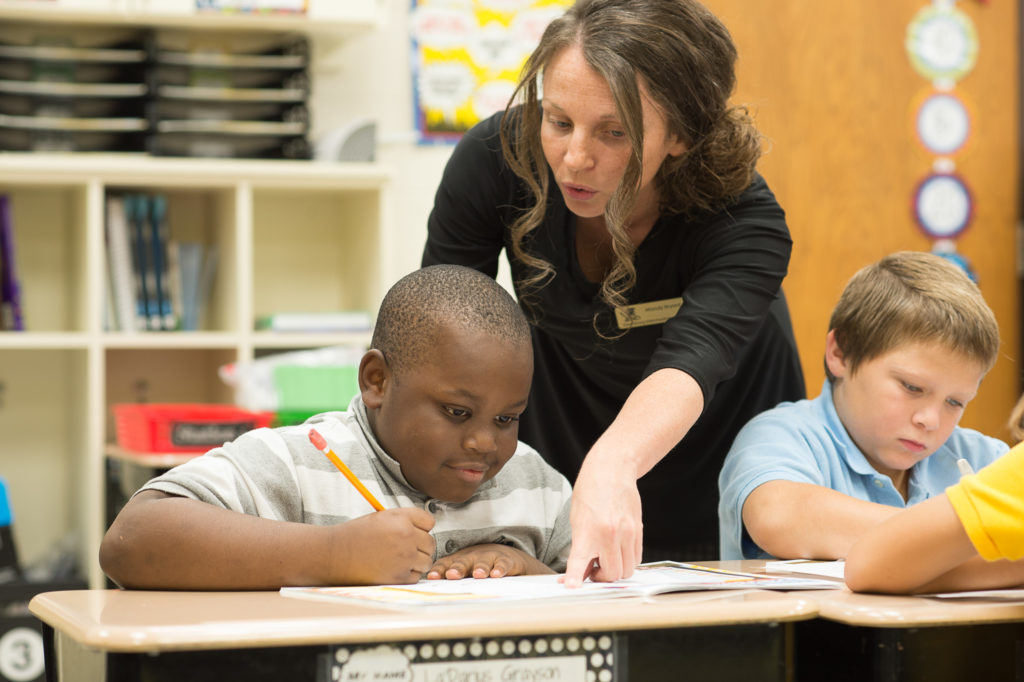
When we think of early literacy, we often think of foundational skills and phonics instruction—the mechanics of learning to read. But there’s another, equally important task during early grades: building vocabulary and knowledge of the world through engagement with rich, complex text.
In order for students to be able to comprehend rich text in later grades, they need a foundation of vocabulary words and mental schema about the world. Tackling a seventh-grade biology text, for example, is a whole lot easier if a student has heard words like “photosynthesis” and “ecological” and discussed concepts like cell division in earlier grades. But for this knowledge to stick, it needs to be delivered in cohesive units, allowing students to take away enduring understandings about those topics. It’s great for a student to understand photosynthesis, but that student also needs to connect it to a larger body of knowledge around how living things use resources, create energy, and grow.
LIFT Education, a group of 12 like-minded Tennessee districts convened by the State Collaborative on Reforming Education (SCORE), has spent the last year and a half collaborating on high-quality early literacy instruction, focusing on building knowledge and vocabulary by piloting knowledge-rich read-alouds in early grades. Most will expand this work in more classrooms this fall.
With strong instructional materials as a foundation, teachers will spend less time compiling or creating lesson material, and more time collaborating with their colleagues to think about the intellectual content of the lesson and how to best engage students. To do this, LIFT teachers will take part in a preparation, implementation, and reflection cycle for each unit. This cycle will support teachers in focusing on those enduring understandings that will develop students’ knowledge, vocabulary, and mental schema over time.
These cycles consist of three major components. Consider a group of Kindergarten teachers teaching a read-aloud unit on plants—the very type of unit that lays the foundation for that seventh-grade biology textbook:
First, teachers prepare carefully for the unit by:
• Reading all texts and considering the vocabulary, concepts, and big ideas—what knowledge and ideas will my students take away? For example, in the Kindergarten unit, the big idea for students might be that all plants need food, water, air, and sunlight to survive.
• Ensuring that the end-of-unit culminating task allows and requires students to demonstrate the enduring understanding of the unit. Simply labeling the parts of a plant wouldn’t show deep understanding of a plant’s needs, but drawing a clear picture of a plant’s full ecosystem and writing one sentence about it would.
• Planning individual lessons with those larger, enduring understandings in mind. How will the texts, questions, and tasks build toward those enduring understandings? How will they get students to that “aha!” moment at some point in the unit so they can complete the culminating task?
Next, teachers implement this planning and teach the unit, bringing this rich preparation to life for students. Teachers in the LIFT network will continue to work with each other throughout implementation, discussing what went well and where to fine-tune their planning. For example, teachers might see evidence in an end-of-lesson task that students don’t fully understand the purpose of a plant’s roots; they might choose to re-read portions of a text on roots or even introduce a new text that talks about roots to boost student knowledge.
Finally, teachers will reflect and debrief after the completion of a unit, looking first at student work on the culminating task. Did students demonstrate the enduring understandings? What areas did they comprehend better than others? Are students making progress toward grade-level standards? And, critically, how does this inform how the unit will be taught in the following year, and how should instruction change for the next unit?
Teachers will implement this cycle in a variety of ways over the coming year, including through weekly PLCs and planning sessions before each unit or quarter. In each district, carving out time for collaboration will elevate teacher practice and professionalism and create better opportunities for students to build knowledge and vocabulary.
This SCORE Sheet post was co-authored by Chris Daniels and Courtney Bell
Chris Daniels is a Project Director with TNTP, where he focuses on early literacy academic strategy with a consortium of districts in Tennessee and cross-LEA collaboration on staffing policies in Washington, DC. Prior to working with TNTP, Chris served at the U.S. Department of Education, at the Bill and Melinda Gates Foundation, and as a seventh-grade math teacher in Philadelphia. He holds a BA in religion from Columbia University, an MS in Education from the University of Pennsylvania, and an MBA from Harvard Business School.

